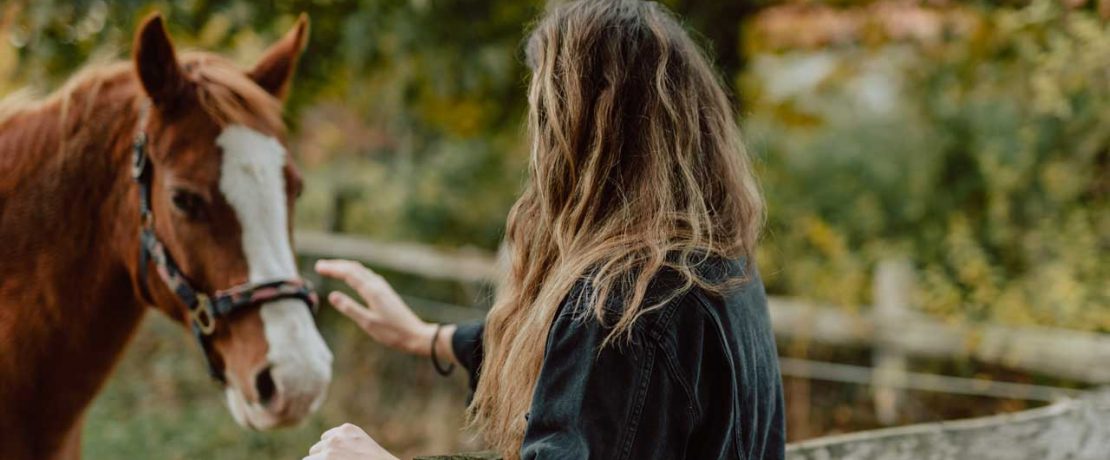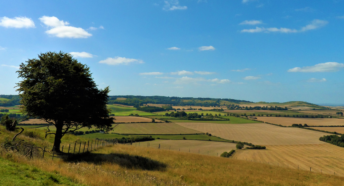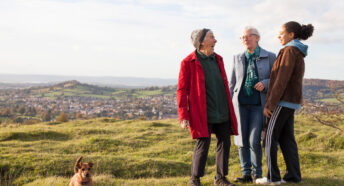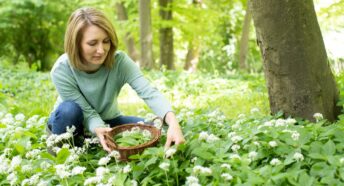Peace of mind
Lots of us know that time in the countryside can make us feel better. But some organisations are going a step further and using the countryside tonic to give people’s wellbeing a real boost.
Most of us have experienced the sense of calm that comes with time spent in the countryside. The fresh air and distractions of nature soothe the mind, and anxieties can be forgotten, however temporarily.
It’s no surprise then that a growing number of health professionals, community workers, naturalists and academics are advocating the use of ‘green therapy’ – time spent immersed in nature – to help those living with mental health difficulties.
‘We’re outdoor creatures,’ says Dominic Higgins, the first ever nature and wellbeing manager at The Wildlife Trusts. He’s at the forefront of this blossoming movement, passionately advocating the importance of the countryside in improving the lives of those suffering from common mental health problems like anxiety and depression – one in six of us according to Mind. ‘We’re built to be outside,’ he explains. ‘All the evidence shows that too much time spent away from green space can lead to chronic stress and other issues.’
Therapy goes green
For those lucky enough to enjoy easy access to the countryside, using nature to freshen the mind and distract from everyday anxieties might not seem a revolutionary idea. But for Dominic and other ‘green therapy’ advocates, the goal is to have the health benefits of being outside enshrined in government health and social policy, making the experience accessible to everyone.
‘The countryside has offered respite from modern environments since the Industrial Revolution,’ says Mike Rogerson, researcher at the Sport and Exercise Science Faculty at the University of Essex, and one of the leading authorities on ‘green therapies’ in the UK. ‘Research has long shown that the environments we spend time in undoubtedly affect our social, physical and mental behaviours. The government still needs convincing, however.’ Mike and his team worked with the Wildlife Trusts to produce the Trusts’ comprehensive three-stage study into the mental wellbeing of Wildlife Trusts volunteers, published in 2017. A key finding was that 95% of study participants with low wellbeing at the start reported an improvement in six weeks, which increased further over the next six weeks. The mental wellbeing of all the participants improved by a significant extent over the 12 weeks that the study took place.
‘We have irrefutable scientific evidence that shows the brain shows patterns of relaxation when in a green environment,’ says Mike. ‘We’ve even seen psychological benefits from people just looking at countryside scenes on television screens – and we have plenty of anecdotal evidence. Now our emphasis has to be on the economic benefits, so that we can make the government really sit up and notice.’
Helping people connect
And the signs are good. The government’s 25 Year Plan to Improve the Environment, published in January 2018, included the need to connect people with the environment to improve health and wellbeing as a key goal. This was warmly welcomed by CPRE; we’ve long argued the mental health benefits of tranquillity, dark skies and Green Belts.
Encouragingly, there’s an increasing number of wellbeing projects being set up in green areas around the UK all the time. Care Farming UK – a network of farms around the country offering therapeutic use of farming practices – has flourished, while large charities such as the Sensory Trust, Mind and Dementia Adventure have all been raising awareness of the importance of nature.
It’s the smaller, localised activities, however, that are really energising the movement at a grass-roots level. At the heart of ‘green therapy’ is the opportunity to connect, both with the nature and wildlife around you and with other people going through similar challenges. Local groups are working hard, often in conjunction with communities, GPs and social care teams, and together they’re providing invaluable respite, support, fresh air and new experiences for people who might not otherwise have found the confidence or the opportunity to explore the great outdoors.
We spoke to the organisers of three such initiatives to find out how their local countryside is helping many people who struggle with their mental health.
Green Army, Isle of Wight
In 2011, the Green Army was set up to encourage vulnerable young adults to get outside, engage with nature, and work as a team on conservation projects around the island. Part of the Natural Wight initiative, hosted by Vectis Housing Association through its Wild About Wight project, the Green Army has seen more than 400 16 to 25-year-olds take part – many joining in with activities on a regular basis. The group was recognised by CPRE Isle of Wight in 2014 for its conservation work, receiving the branch’s Merlin Trophy, along with CPRE-sponsored conservation kit.
‘The people who join us are homeless, living in supported accommodation and are neither in employment or education,’ explains project coordinator Claire Hector. ‘Many have come from chaotic family backgrounds and many are living with mental health problems of one kind or another.
‘The Green Army is a unique opportunity for them to spend time away from their day-to-day lives and benefit from the wonderful countryside we have here on the island.’
Sessions take place every fortnight, whatever the weather, and might involve nature conservation work, den building, outdoor art activities or nature walks with local experts. Claire has noticed innumerable benefits to those who’ve come to Green Army over the years, not least a total change of scenery and distraction from issues faced at home. The experience of being outside in new environments, learning new skills and overcoming challenges creates a feeling of bonhomie, being ‘in it together’, that Claire says many participants have seldom experienced. Then, of course, there are the obvious benefits of clean air, exercise and time away from technology. Claire remembers one first-time participant who got to the end of a four hour session and realised that he hadn’t looked at his phone once. ‘He couldn’t believe it,’ she laughs.
Jazz Wood is a regular Green Army member and a keen advocate of using time with nature and in the countryside to help those living with mental health issues, having experienced problems herself. ‘Green Army is such a welcoming and friendly community of people,’ she says. ‘We all come from different backgrounds and different walks of life but get on and work together. It has given me my love for the outdoors back, a sense of belonging, and the realisation that getting outside and doing something in nature cheers me up and makes my day so much better. It has also challenged me physically and made me realise I can do more than I think I can.’
Green Army is such a simple idea, but anyone can benefit. Claire has particularly noticed the calming influence nature and open space has on those participants who display signs of anti-social behaviour in their day-to-day lives. She has also seen the quiet and isolated gain self-esteem once they’ve started learning new skills and become part of a team.
‘Nature is therapy,’ she says. ‘It frustrates me that modern life has become about boxing ourselves up, removing ourselves from nature. It’s sensory deprivation, really. I’m hoping that, through successful projects such as ours, people are beginning to recognise the vital importance of nature and the wild for our brain health.
Askefield Project, Lincolnshire
Hannah Blevins and her family have only been running the Askefield Project – their small Lincolnshire care farm – since October last year, but already they’re seeing the positive impact that being outside has on those with mental health issues. ‘We have people coming here who arrive tense, shy and nervous and leave laughing,’ says Hannah.
The family bought their smallholding near Boston in Lincolnshire in 2006, but it took a while before the idea of care farming took hold. It was a volunteer who had been living in a caravan on the land and had suffered from borderline personality disorder that came up with the idea of care farming.
‘Soon after that we saw a feature about care farms on Countryfile,’ says Hannah. ‘We saw how much people had been helped and knew straight away that it was a wonderful way to use the land we had.’
A typical day at the Askefield Project might include anything from feeding animals, moving sheep or building a henhouse (‘But always with lots of tea, coffee and cake!’ adds Hannah). The day is very much led by the visitors and they can choose how they would like to spend their time on the farm. ‘For many of our visitors, being in the fresh air and achieving something, however small, is enough to make the day a success. For others it’s the routine or just being around the animals. We have a number of visitors suffering with post-traumatic stress disorder, and working with the animals seems to be particularly beneficial to them.’
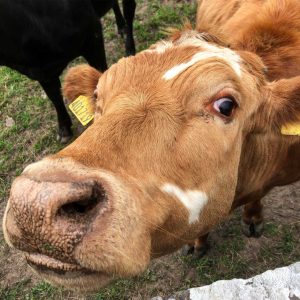
So far people have found the Askefield Project through social media, word of mouth and referrals from local job centres, but Hannah is hoping to build on her relationship with the Lincolnshire Partnership NHS Foundation Trust to welcome regular groups and even patient referrals from local GPs. However, even after a relatively short time running a care farm, Hannah has realised that outside funding will make or break the project.
‘Anyone can see that care farming can, and does, change people’s lives,’ she says. ‘But funding still isn’t there. For a small project like ours, that’s a worry.’
mindSCAPE, Wye Valley
The Wye Valley has always been a hive of outdoor activity, but for one group, the scenery and fresh air have become a real lifeline. MindSCAPE is a lottery-funded project, developed to enable people with dementia, and their carers, to reconnect with the landscape in a social, creative way. Organised by arts group Artspace Cinderford, the project has proved so successful that further funding is already being sought to take mindSCAPE beyond the four years it was originally intended to run.
The project was set up in 2014 after a consultation held by the Wye Valley Area of Outstanding Natural Beauty found that people with dementia and their carers were the group least likely to engage with the outdoors. ‘A number of barriers were highlighted by the report,’ says project leader Hannah Elton-Wall. ‘Transport was a big issue, but a lack of confidence about leaving the house and spending time in the countryside, away from the amenities at home, was the biggest stumbling block facing carers of people with dementia in particular.’
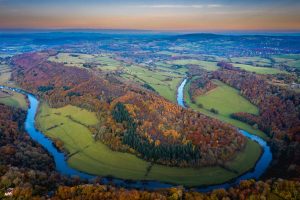
To remedy this, mindSCAPE found the perfect location for its sessions – a smallholding and 27 acres of woodland in the Wye Valley owned by the Orchard Trust, a charity providing services for people with disabilities. ‘It’s so important for our participants to feel safe and secure before they can start enjoying the outdoors,’ explains Hannah. ‘But once they’ve got over some anxieties on their first visit, everyone loves it.’
The project uses the arts to engage participants, and emphasises the pleasure gained by just ‘being’ in nature, rather than the idea that you need to walk miles to enjoy the outdoors.
‘The people who come to mindSCAPE love the simple things,’ says Hannah, ‘whether that’s sitting in the sunshine, eating outside or letting their surroundings inspire them in the arts activities we organise. ‘It’s also wonderful to see how nature can stir the senses of those people with dementia that we see. The touch, sounds and smells of nature often spark memories of happy holidays they may have had, or even memories of childhood.’
And it’s not just those living with dementia that benefit from mindSCAPE. The group offers invaluable support and respite for the loved ones who care for them, plus the rare chance to take part in and enjoy activities together.
‘Caring for someone with dementia is highly stressful and often isolating,’ explains Hannah, ‘but here everyone is in the same boat, and the atmosphere is always positive and warm. The carers get to relax and enjoy nature, safe in the knowledge their loved ones with dementia are doing the same.’
This article, or a version of it, was originally published in CPRE’s award-winning magazine, Countryside Voices. You’ll have Countryside Voices sent to your door three times a year, as well as access to other benefits including discounts on attraction visits and countryside kit from major high street stores, when you join as a CPRE member. Join us now.
